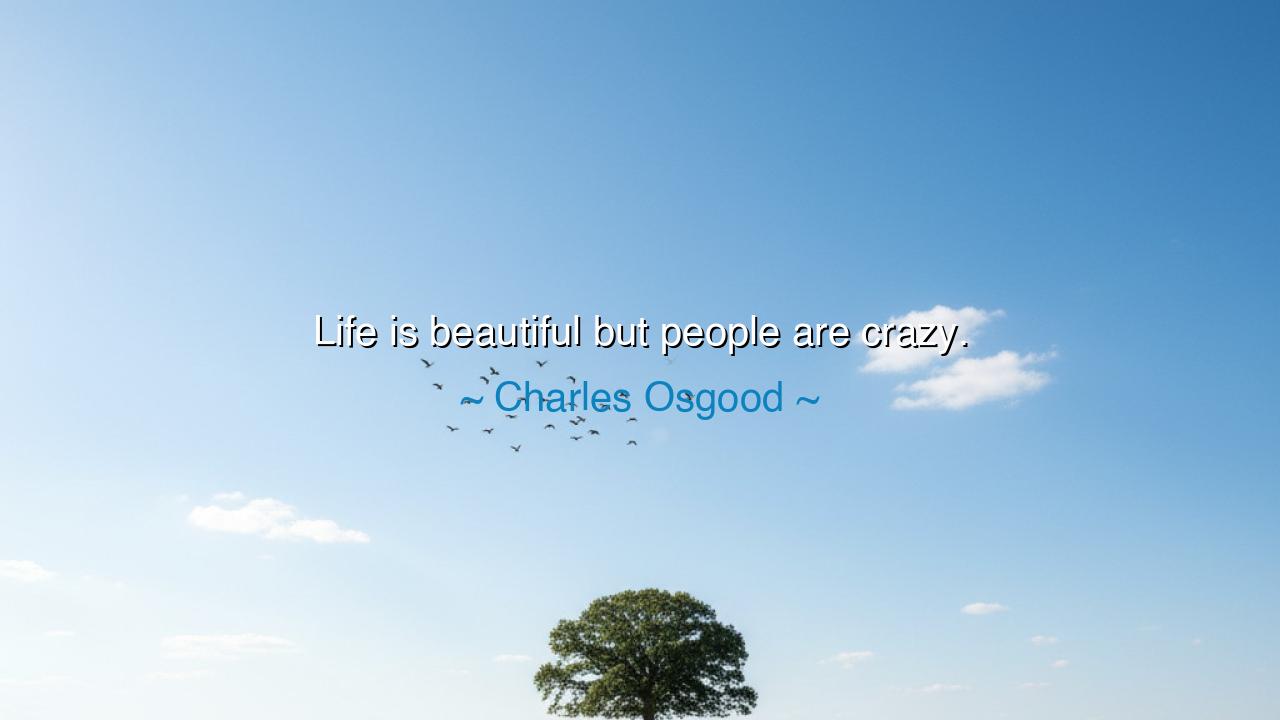
Life is beautiful but people are crazy.






Charles Osgood, with the wit of a sage who had looked long upon the human condition, declared: “Life is beautiful but people are crazy.” In this brief sentence lies a paradox as old as the world itself. For indeed, the earth is clothed in splendor—the sunrise over mountains, the laughter of children, the fragrance of spring after rain. Yet alongside this beauty walks folly: men waging wars for pride, neighbors quarreling over trifles, hearts blinded by greed and envy. Osgood speaks as one who has seen both the majesty of existence and the madness of mankind, and he reminds us that wisdom lies in embracing both truths at once.
The ancients knew this well. The philosophers of Greece marveled at the harmony of the cosmos, yet lamented the chaos of the city. Marcus Aurelius, emperor and Stoic, wrote that the stars above were divine, yet the intrigues of men were wearisome and petty. In every age, the wise have beheld the same contradiction: life is beautiful, yet people, with their passions unchecked, often act in ways that seem crazy, irrational, or self-destructive. This is not new—it is woven into the fabric of history itself.
Consider the story of Vincent van Gogh. He saw beauty in fields of wheat, in sunflowers blazing like fire, in the night sky alive with stars. He painted life’s glory with unmatched vision. Yet people around him dismissed him as mad, a burden, even a fool. In his lifetime he sold but a single painting. Here the paradox shines: he revealed life’s beauty, but those around him, in their blindness, treated him with cruelty and disregard. Only after his death did the world awaken to the treasures he left behind. Truly, life was beautiful, but people were crazy.
And yet, O listener, this is not cause for despair. For in recognizing the madness of men, we are called to compassion, not cynicism. Every act of folly reveals a wound within the human heart, and every unkindness springs from fear, ignorance, or pain. If we expect perfection from our fellow mortals, we shall be bitter. But if we expect imperfection, and meet it with patience, then we shall live in peace, cherishing the beauty of life without being undone by its madness.
History, too, proves that amidst the craziness of mankind, there are always voices of light. Think of Gandhi, who faced the violence of empire with the beauty of nonviolence. Think of Anne Frank, who in the midst of humanity’s darkest madness still wrote: “I still believe that people are really good at heart.” These lives show us that though people may act irrationally, beauty still rises like dawn from the night, and hope endures even in chaos.
The lesson, then, is clear: embrace the beauty of life with gratitude, but do not be surprised when people act foolishly. Expect storms, but do not let them blind you to the sunrise. Laugh at the absurdities of men rather than letting them steal your joy. Seek out those who uplift you, and when you encounter folly, meet it with wisdom, patience, and even humor. For if life is beautiful, then we are charged with protecting that beauty, even against the madness of our kind.
Practical wisdom flows from this: each day, give thanks for the small beauties that surround you—a smile, a song, a flower in bloom. And when confronted by the craziness of others, take a deep breath before you respond. Do not allow their folly to become your folly. Instead, let your steadiness be a light in their storm. In this way, you will both preserve your own peace and contribute to the beauty that makes life worth living.
So, O children of tomorrow, carry this teaching within you: life is beautiful but people are crazy. Hold both truths in your heart, and you will neither be naïve nor despairing. Instead, you will walk the middle path of wisdom—rejoicing in the beauty, forgiving the madness, and adding your own light to the eternal flame of life’s wonder.






AAdministratorAdministrator
Welcome, honored guests. Please leave a comment, we will respond soon